NHS staff face unprecedented job losses, says boss
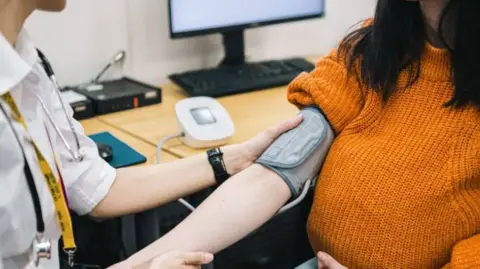 Getty Images
Getty ImagesA senior NHS leader has said the health service is facing "unprecedented times" as budget cuts and job losses loom.
Amanda Lyes, from the NHS Suffolk and North East Essex Integrated Care Board (ICB), was speaking at a board meeting on Tuesday.
Hundreds of NHS workers across the East of England face uncertainty over their jobs and the various ICBs in the region could be merged together.
The Suffolk and North East Essex ICB is in talks that could see redundant staff given retraining opportunities at local colleges.
In March, the government announced it wanted ICBs to halve their running costs to "tackle inefficiencies and drive up productivity in the NHS".
Ms Lyes, director of workforce and people at her ICB, told the meeting: "We have never experienced the degree of change that we are currently experiencing."
The Suffolk and North East Essex ICB is facing cuts of £17m by next December's deadline, which has been imposed by the Department of Health and Social Care (DHSC).
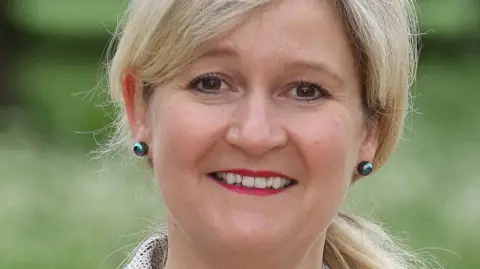 SNEE ICB
SNEE ICBAnalysis by the BBC indicates that approximately 3,200 staff work for the six ICBs in the NHS's eastern region.
With each ICB being asked to cut running costs by 50%, redundancies are likely to run in the hundreds, if not more.
ICBs manage budgets for hospitals, GP surgeries and dentists.
They plan and fund health services and are responsible for improving population health.
Ms Lyes said her organisation would begin merging with other NHS services in September and there was "an awful lot to be done".
The meeting was told the number of ICBs in the East of England would be cut from six, to three, but with three options on the table for how this could look.
This plan is due to be decided on by June.
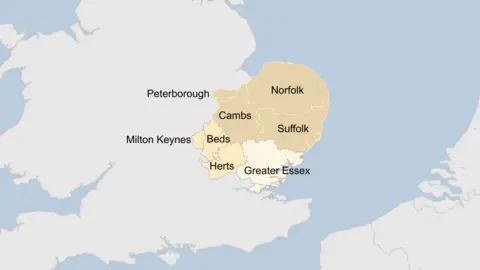
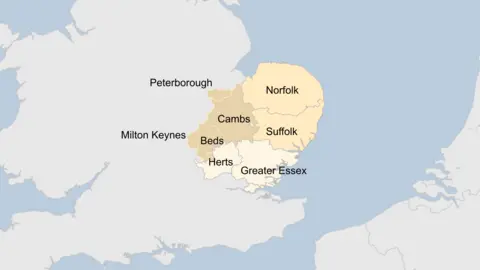
Dr Ed Garratt, chief executive of the Suffolk and North East Essex ICB, said there was a "significant redundancy risk" for NHS support staff across England.
He told the meeting about conversations with a local chain of further education colleges to identify opportunities for them to acquire new skills.
"Unfortunately, the health service is in a period of retrenchment now," he said.
"There are lots of industries looking to employ people."
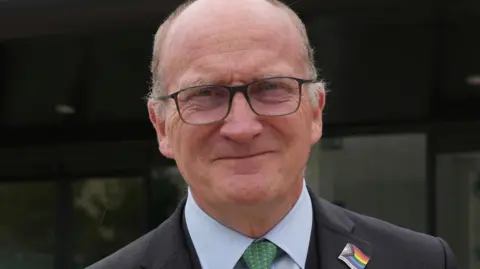 Nikki Fox/BBC
Nikki Fox/BBCNick Hulme, chief executive of the East Suffolk and North Essex Foundation Trust (ESNEFT), which runs Ipswich and Colchester hospitals, said the reorganisation of ICBs could bring problems.
One model under discussion could mean ESNEFT's acute and community services were commissioned by two separate organisations.
"It would be tricky," he said.
He described the whole process as "incredibly disruptive" for his staff.
'Challenging pace'
A DHSC spokesperson said the government aimed to "cut bureaucracy to invest even further in the front line" to "support hard-working staff and deliver a better service for patients and taxpayers' money".
The NHS Confederation, which represents employers in the health service, said it was braced for significant job losses and had lobbied for a voluntary redundancy scheme to be put in place.
"Moving forward at this kind of pace is a challenge," said Sarah Walter, director of the Integrated Care Systems Network for the confederation.
"We will want to ensure that whilst delivering those cuts and savings, we still are also able to ensure we've got enough attention on NHS services and the improvements we want to make for patients."
Follow East of England news on X, Instagram and Facebook: BBC Beds, Herts & Bucks, BBC Cambridgeshire, BBC Essex, BBC Norfolk, BBC Northamptonshire or BBC Suffolk.
